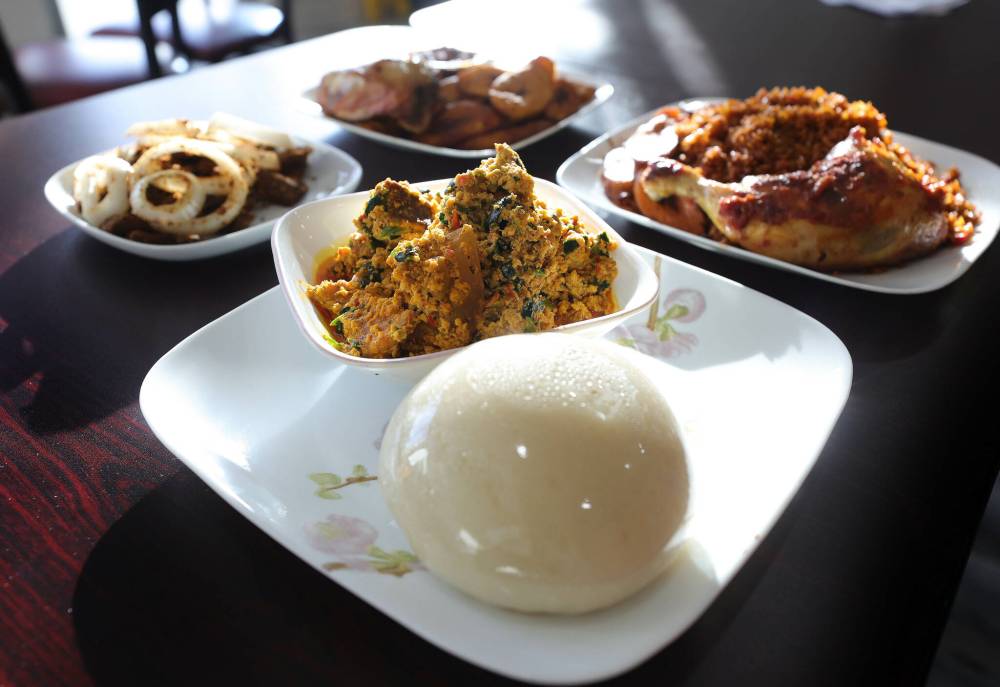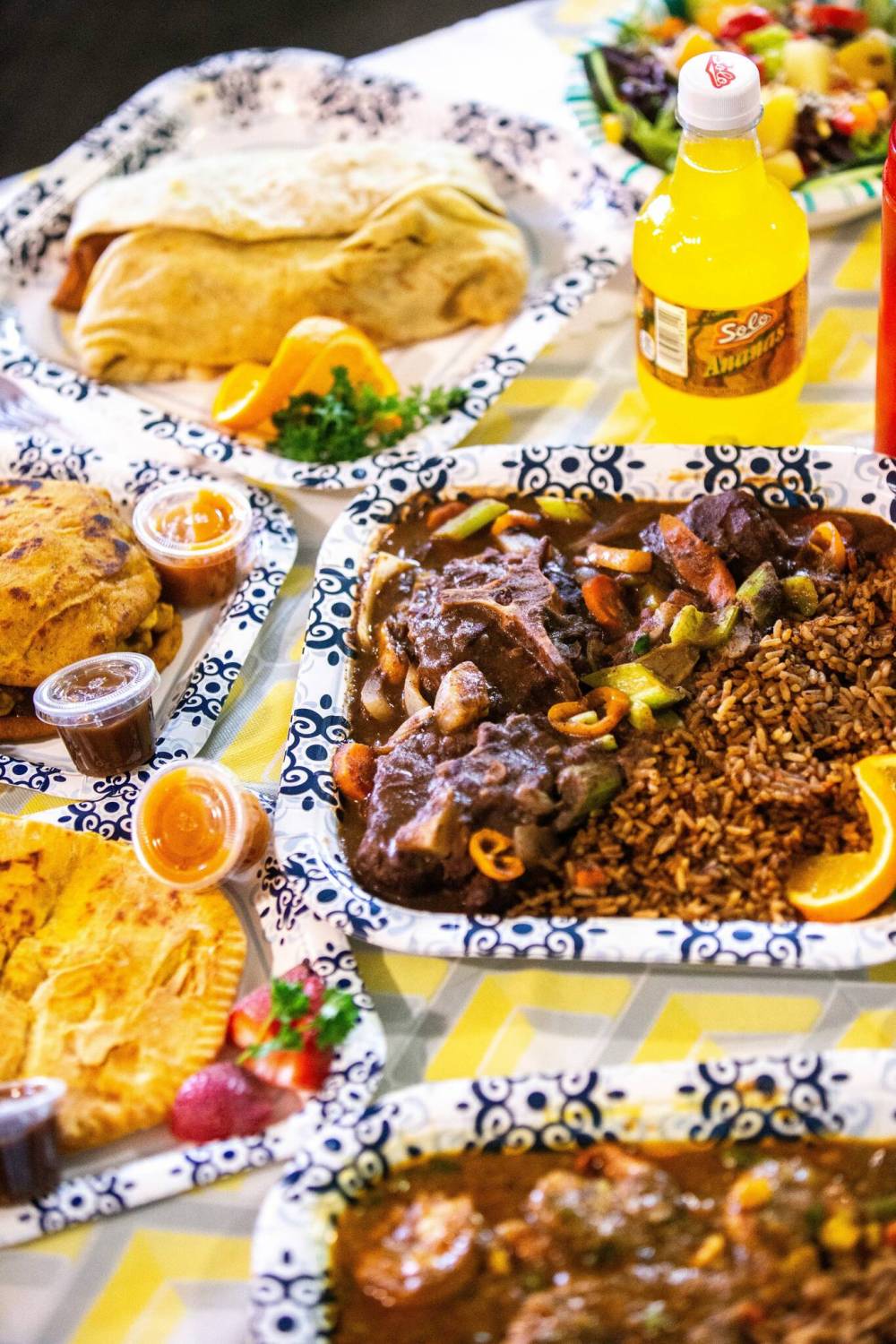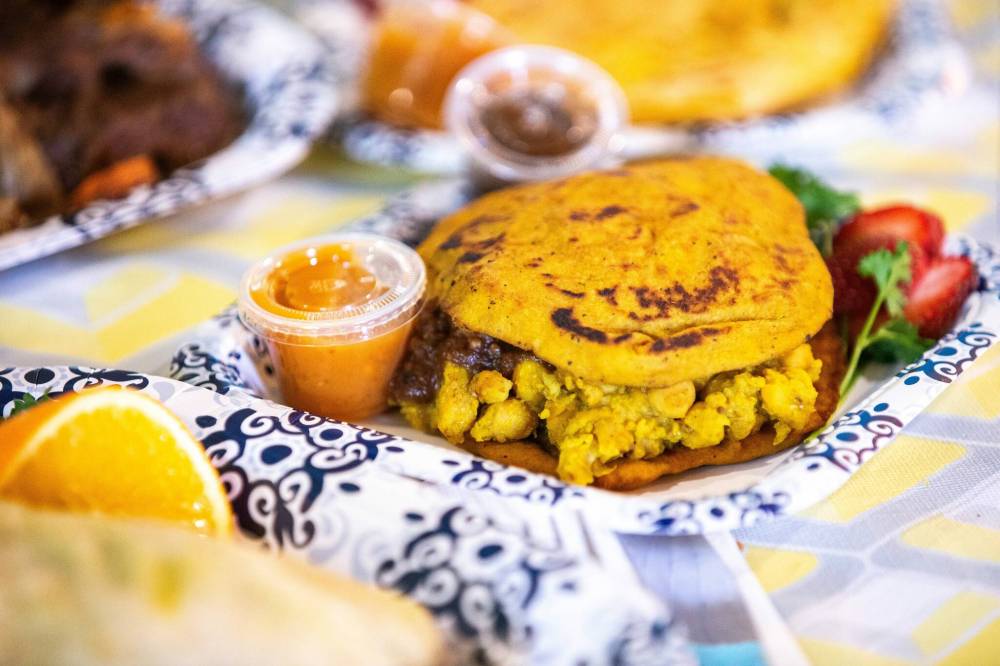‘Flavours of life’ Winnipeggers have more options than ever when it comes to the cuisines of East and West Africa and Caribbean
Read this article for free:
or
Already have an account? Log in here »
To continue reading, please subscribe:
Monthly Digital Subscription
$0 for the first 4 weeks*
- Enjoy unlimited reading on winnipegfreepress.com
- Read the E-Edition, our digital replica newspaper
- Access News Break, our award-winning app
- Play interactive puzzles
*No charge for 4 weeks then price increases to the regular rate of $19.00 plus GST every four weeks. Offer available to new and qualified returning subscribers only. Cancel any time.
Monthly Digital Subscription
$4.75/week*
- Enjoy unlimited reading on winnipegfreepress.com
- Read the E-Edition, our digital replica newspaper
- Access News Break, our award-winning app
- Play interactive puzzles
*Billed as $19 plus GST every four weeks. Cancel any time.
To continue reading, please subscribe:
Add Free Press access to your Brandon Sun subscription for only an additional
$1 for the first 4 weeks*
*Your next subscription payment will increase by $1.00 and you will be charged $16.99 plus GST for four weeks. After four weeks, your payment will increase to $23.99 plus GST every four weeks.
Read unlimited articles for free today:
or
Already have an account? Log in here »
Hey there, time traveller!
This article was published 27/02/2024 (614 days ago), so information in it may no longer be current.
Jollof rice is a West African staple. It’s immediately recognizable — each grain in this dish is coated in vivid hues of orange and red, courtesy of the tomato and pepper paste in which the rice is cooked.
The origin of jollof is hotly contested, and there’s a friendly rivalry among the nations, called the Jollof Wars, with countries including Ghana, Nigeria, Senegal and Gambia claiming their version is the best.
Almost every country in the region has its own take on the dish, but whatever the style, one thing is sure — it’s delicious.
At D&D Afrikana (789 Ellice Ave.), the Jollof is strictly Nigerian.
D&D Afrikana owners David Ogunrewo and his mom, Esther, with a few of the restaurant’s signature dishes.
“Jollof rice is the most recognizable of all Nigerian food. It’s considered a main dish, which we would serve with a side of turkey, chicken, beef, fish or plantain,” says David Ogunrewo, one of the two chefs at the restaurant — the other being his mother, Esther.
“The cooking process is what makes each jollof different. We use long-grain parboiled rice. First we fry the sauce, which is made with tomato paste, spices and bell peppers, and then we add the rice into the sauce with more seasonings and cook it all together.”
Ogunrewo, one of the Ds of D&D Afrikana (his sister Divine is the other) works alongside his mother in the kitchen. The restaurant, which opened its doors last summer, serves Nigerian staples such as the aforementioned jollof rice, swallow and soup, yam porridge, and suya, a grilled meat dish unique to the Hausa culture in northern Nigeria and southern Niger.
Some dishes at D&D Afrikana include Egusi and pounded yam.
“We serve all three regional cuisines here: Igbo, Hausa and Yoruba,” Ogunrewo says. “That’s how the name came about. We thought this is an African kitchen and is a good way for people here to learn about our food.”
Food has always been one of the simplest ways to be introduced to a culture, and nowhere is this more obvious than in our city. Winnipeggers are spoiled for choice when it comes to sampling global flavours. Our large immigrant population affords us a multitude of options, from the ubiquitous butter chicken to the familiar chicken chow mein and comforting pho.
In more recent years, there’s been a proliferation of restaurants specializing in West African, East African and Caribbean cuisine.
West African establishments such as Akin’s Kitchen on Sargent, Atiga on William Avenue and Jollof Life on Portage Avenue are introducing previously unfamiliar flavours and ingredients to our plates: fufu, made from pounded cassava and eaten with peppery fish soup; goat cooked with fiery scotch bonnets and smoked with mesquite; and moi-moi, a delectable steamed bean cake made with honey or black-eyed beans, peppers, fish and eggs.
At Carribbean restaurants, spices such as nutmeg or mace, allspice, cumin, cinnamon and paprika abound. At the eponymous Miss Christine’s Kitchen on Provencher, the lady herself cooks jerk chicken, oxtail and pepper shrimp, served with purple-tinged rice and peas.
On Portage there’s K&S Island Grill, which does a mean escoveitch (marinated fish) with festival (a crispy dumpling), and Deen’s on Marion Street is beloved for its doubles (a type of flatbread with a curried filling).
Ethiopian restaurants such as Gohe on Notre Dame, Mesob on Osborne Street and Red Cherry Café in the Skywalk at Portage Place serve dishes bursting with flavour. Along with meat-forward mains such as tibs (marinated meat cooked in spiced butter) and fitfit (curried stew cooked with spices and mixed with injera bread), Ethiopian cuisine offers a varied range of vegan food, with stews and stir-fries featuring lentils, chickpeas and cabbage.
Oldest tradition
At Habesha Ethiopian Restaurant (594 Ellice Ave.), Mimi Tesema’s kitchen is redolent with fenugreek, cinnamon, ginger, cardamom and coriander, and the distinct scent of fresh coffee.
Every Sunday Tesema clears the space on the floor of her restaurant to brew coffee and make popcorn. It’s an important ritual, linking her to her youth in Ethiopia, where buna kurse is part of life.
The coffee ceremony is one of the country’s oldest traditions.
“Coffee is meant as a contact, to be part of the culture and the community,” Tesema explains. “When you make coffee, you call your neighbours, you say ‘Coffee is ready,’ and you have dabo with it, a spiced bread made with Ajwain and cumin seeds and baked in banana leaves. You drink three cups, you sit a few hours and then you go.”
Tesema opened the restaurant in September 2020 during the pandemic. It’s always been her dream to be a restaurateur. It’s in her blood; her mother owns a restaurant in Nazret, a town about 100 kilometres south of the Ethiopian capital Addis Ababa.
Mimi Tesema, chef-owner at Habesha Restaurant, says the coffee ceremony is one of Ethiopia’s oldest traditions.
She’s made sure the menu includes her favourite dish, kitfo, which she recommends having with cottage cheese and kale.
“It’s raw minced beef, marinated in a spice mix called mitmita and niter kibbeh, clarified butter infused with herbs and spice. It’s delicious.
“We also make a spicy chicken stew, doro wat, with whole and ground spices. We usually make it during holidays back home, but we have it at the restaurant here every day.”
In Habesha, coffee and popcorn is served on Sundays, but they’re also offered at the end of the meal — a meal that, of course, features injera.
The thin bread, made with teff flour and water batter allowed to ferment, is the cornerstone of Ethiopian cuisine.
Quanto Firfir, dried beef stewed in berbere
sauce, at Hebesha Ethopian Restaurant.
“Without injera there is no Ethiopian food,” Tesema says with a laugh.
The spongy, slightly sour flatbread, a little thicker than a crepe, has a porous surface, making it the perfect vehicle for the robustly flavoured stews, known as wats, that sit atop it.
Served on large communal plate, it serves as both as a carrier for dishes and a utensil.
At Habesha, each injera meal is served with seven or eight different kinds of wats, including a red lentil stew and two kinds of beef stew, one cooked with berbere, a typically Ethiopian hot and peppery spice made from chilies, holy basil seeds, nigella seeds and fenugreek. The other less spicy stew is made with turmeric.
Oxtail curry and a selection of other dishes
at Tropikis Restaurant.
At Tropikis Caribbean Restaurant (878 Ellice Ave.), another type of bread rules supreme. The dhalpuri roti swaddling the chicken and potato filling is Trinidadian chef Denesh Bahadoosingh’s speciality.
The halal restaurant has been doing a roaring trade for the last 40 years, with sole chef Bahadoosingh slinging out plates of rice served with oxtail, conch, elk or bison.
Bahadoosingh, originally from Tunapuna, Trinidad, moved to Canada as a teenager in the 1970s. He opened Tropikis as a way to introduce Winnipeggers to the foods of his country.
“I had no formal training before I went into the food industry. At that time, Caribbean food wasn’t popular here, so I chose something that was close to my heart, which is roti. Nobody else was doing it at that time,” he says.
He sells his homemade frozen rotis to both customers and other restaurateurs alike.
“I wanted to mass produce it and ship back to Trinidad, if you would believe that,” he says, laughing.
He’s cooked for four generations of the same families, loyal customers who keep returning for the callaloo soup, Jamaican patties and chickpea doubles.
A chickpea and tamarind double at Tropikis Restaurant.
“In the early years when we started, Winnipeg was not a hub for herbs. Because of the influx of new immigrant communities, these herbs started becoming more common at places like Lucky and Young’s (global groceries) in the city. They started importing herbs like nutmeg, green herbs like peppermint and mint and something called bandanya (Mexican coriander), which is grown wild in Trinidad and it has its own unique flavour in the foods.”
Because of the availability of these herbs and spices, he says his food has flavours as close as possible to what you can get “back home.”
“In the last 15 years I was able to take my dishes and make them taste similar to what you can get in Grenada, in Jamaica, in Trinidad. Now the people in the north can understand our flavours of life.”
av.kitching@winnipegfreepress.com
Tasty Tidbits
New Thai flavours on Roblin
Charleswood residents with a taste for Thai food, rejoice — on Feb. 15, Sassy Thai opened its doors at 3311-C Roblin Blvd. in the space formerly occupied by Joy Coffee Bar. The menu features a range of fish dishes as well as soups, salads, stir fry and noodle dishes and more. They also do catering. See their website sassythaiwpg.com for more info.
Michelin-starred chef returns to Fort Garry
Italian chef Rosanna Marziale returns to Vida Cucina Italia at the Fort Garry Hotel from March 5 to 7 for a special five-course pasta-tasting menu. Marziale is the Michelin-starred chef who, with longtime friend Ida Albo of the Fort Garry, brought the Vida concept to life. (The white-tablecloth eatery opened in the fall of 2023.) For $75, guests get to sample a range of Marziale’s takes on classic pasta dishes, some of which will be appearing on Vida’s spring menu; for $40 more, guests get wine pairings with each dish. Visit vidacucinaitalia.com to reserve a spot.
Potato Week rolls in
Get ready for another starchy food festival. Potato Week starts Friday and runs to March 10 with dozens of Winnipeg restaurants putting their best spuds forward. Hosted by Peak of the Market, the annual event is a celebration of local chefs and potato growers. Some creative creations include a glazed potato fritter from Bronuts, a potato vodka cocktail from One Great City Brewing Company and deep fried pork and potato wontons from Oh!Good!Path! Visit potatoweek.com to find a full list of participants.
Dwarf no more
The future is uncertain for Dwarf No Cachette, a cutesy Japanese cafe in St. Boniface. Owners Yasuko and Takekuni Akimoto announced earlier this month that their current location on Provencher Boulevard has been slated for redevelopment. The restaurant will continue operating until the end of October, but the owners are undecided about what comes next. Get your onigiri and takoyaki fix while you can.
More fine dining downtown
WOW Hospitality’s satellite steakhouse is set to open next month. The launch of 529 Uptown, the downtown sibling of 529 Wellington, has been in the works for years and was originally slated to open in 2023. The high-end breakfast and lunch spot is located in the lobby of 201 Portage Ave. and will feature 85 different fine wines, according to a recent missive from WOW boss Doug Stephen.
Hot dogs cooking at Handsome Daughter
A new name and menu are coming to the Handsome Daughter’s kitchen space at 61 Sherbrook St. Doggystyle, which will include regional variations of hot dogs from around the world, including Chicago, Coney Island, Seattle, Japan and a Winnipeg version loaded with perogies, sour cream and bacon, is scheduled to open March 6. Magic Bird Fried Chicken, which had been in the space since 2018, had to close last month after its ventless deep fryer broke down, says head chef Mike O’Connell, who is also behind Doggystyle.
— With files from Eva Wasney and Ben Sigurdson and Alan Small
For more local culinary news, sign up for Dish, our twice-monthly food and drink newsletter.

AV Kitching is an arts and life writer at the Free Press. She has been a journalist for more than two decades and has worked across three continents writing about people, travel, food, and fashion. Read more about AV.
Every piece of reporting AV produces is reviewed by an editing team before it is posted online or published in print — part of the Free Press‘s tradition, since 1872, of producing reliable independent journalism. Read more about Free Press’s history and mandate, and learn how our newsroom operates.
Our newsroom depends on a growing audience of readers to power our journalism. If you are not a paid reader, please consider becoming a subscriber.
Our newsroom depends on its audience of readers to power our journalism. Thank you for your support.
